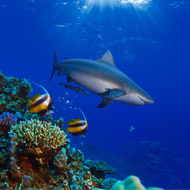Microplastics 'pose significant threat' to manta rays and sharks

Filter feeders need to swallow thousands of cubic meters of water every day to capture plankton.
Tiny particles of plastic pose a significant threat to filter marine feeding animals like manta rays and sharks, scientists have warned.
Writing in the journal Trends in Ecology & Evolution, PhD student Eliza Germanov warns that microplastics could be dangerous because they contain toxic chemicals.
Over many years, chemicals associated with plastic can build-up and change biological processes in animals, she notes. In turn, this can lead to altered growth, development and reproduction, including reduced fertility.
Germanov adds that while a definitive connection between microplastic ingestion and toxin exposure for filter feeders must be confirmed, studies into seabirds and small fish have noted a link.
Filter feeders need to swallow thousands of cubic meters of water every day to capture plankton. At the same time, they can ingest microplastics directly through polluted water or indirectly through contaminated prey.
Ms Germanov is now carrying out research to understand how levels of plastic associated toxins are building up in manta rays and whale sharks. She hopes that the study will aid the understanding of microplastic contamination and shed light on the health of filter-feeding species.
“As plastic production is projected to increase globally, the establishment of long-term monitoring programs is needed in the feeding grounds of these ocean giants so that we can check on toxicity levels in these creatures over a period of time,” she said.
“The microplastics issue potentially places the viability of nature-based tourism involving these creatures under threat also. This kind of tourism is a significant source of income in the regions where filter feeders congregate.”
She adds: “Raising awareness of this issue in communities, among governing bodies and industries could help to change behaviours around the production, management and use of plastics.”



 HMRC has invited feedback to its communications regarding the employment status of locum vets and vet nurses.
HMRC has invited feedback to its communications regarding the employment status of locum vets and vet nurses.